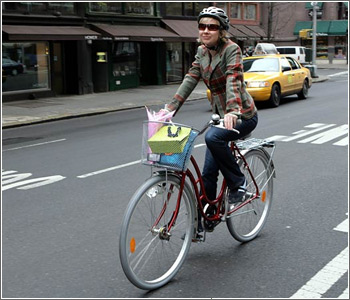My bike is going to kill me. That was all I could think about as I rolled the thing out of my apartment and made those initial awkward pedal pushes in my first ride around downtown Toronto.

But gliding along Queen St., with no angry cars honking or getting too close to my wheels, I figured I might actually get home alive. If I could just remember the road rules.
Hand signal directional changes. Turn left on left lanes only, or get off the bike and cross the intersection like a pedestrian. If you're changing lanes near streetcar tracks, approach them at a sharp angle so your tires don't get caught in them. And for God's sake, don't pass cars on their right-hand side at stoplights.
You know the saying that you never forget how to ride a bike? Apparently I had. Or was too scared to remember. Either way, I'm not the only one. Studies from Australia and the U.S. identify me with a demographic researchers insist is key to promoting urban cycling: women.
Jan Garrard, senior public health lecturer at Deakin University in Melbourne, Australia, calls us an "indicator species." Women are more likely than men to avoid cycling because they see it as dangerous. The extent to which women hop on their two-wheelers, or fail to do so, is a good indication of how developed a city's cycling infrastructure is – how safe it is for biking, how accessible and extensive its bike lanes are.
Women in North America largely don't ride bikes. In areas where they do, such as Europe, there are more cyclists on the road overall.
John Pucher, a professor of planning and public policy at Rutgers University in New Jersey, has studied this trend for over 12 years. He found that in Denmark, where 18 per cent of all commutes are by bike, women make up 45 per cent of cyclists on the road. In the Netherlands, where women cyclists are in a slight majority at 55 per cent, cycling takes up nearly a third of all commuting trips.
We Canadians, however, aren't doing so well at a 30 per cent bike share for women, and maybe a 2 per cent commute share for bikes. (The trend is similar in the U.S and Australia.) In Toronto, just 1.7 per cent of the population rode to work in 2006 – just 35 per cent of them female. But we're not the worst city, laughs Pucher. "In Dallas, Texas, 95 per cent of bicyclists are men. Which is disgusting!"
Garrard, meanwhile, explores the psychology behind the numbers – why most women refrain from riding in the first place. She surveyed Melbourne's cycling population by asking what situations kept them from the road.
"For just about every constraint we included in our item list," she says, "women were more likely to say it was a constraint. And these things included traffic conditions, weather, lack of time."
Sounds familiar to me. Though I'd have added fear of my face in the pavement.
A larger number of women also indicated they preferred off-road routes, or paths separate from cars. Last month, Scientific American reported on a Portland, Ore. study that coincides with this, having tracked Portland cycling commutes by GPS. When given the choice, women were more likely to take longer routes to a destination if it meant using a car-separate path.
Which is something cycling advocates in Toronto would argue we don't have enough of. Most are intended for recreational use – not a lot of help if you're trying to get to work, which is largely why I wanted to cycle in the first place.
Pucher points out that the idea isn't to paint the non-cycling majority of women as timid creatures, and that other bike minorities, children and seniors, are also important in gauging a city's bikeability.
"I'm pretty risk-averse myself," he says. "I think anyone who is concerned with safety is going to want some kind of facilities that address those concerns."
There are bike shops in Toronto that try to, by offering women-only programs that teach bicycle repair and construction and traffic laws.
Sherri Byer, co-ordinator at the Community Bicycling Network on Queen St. W., finds she still gets condescended to in unfamiliar cycling shops, even though she's been fixing bikes for eight years.
"I think that's why Wenches with Wrenches is so popular," Byer says of CBN's four-week program, which aims to provide women with a non-competitive learning space. "I kept thinking the market for it would dry up for it, but it's not."
I figured the Sunday sessions for women and transgendered people at Bike Pirates, a cycling co-op on Bloor and Lansdowne, was a good place to start. If I did the work they would supply me with the help, space and tools to build a bike of my own.
And as Lisa McLean, a Sunday volunteer, points out, there's a certain confidence that comes from knowing how your bike works.
That may not stop me from slamming into the open door of a parked car, I think to myself as McLean shows me how to install ball bearings into a stem. But at least I can fix my bike afterwards.
Besides, I can't imagine any of the women working at Bike Pirates fitting into the description of risk-averse or road-shy. With any luck (and a lot more riding), hopefully I will eventually count myself among them.
From The Star.com
